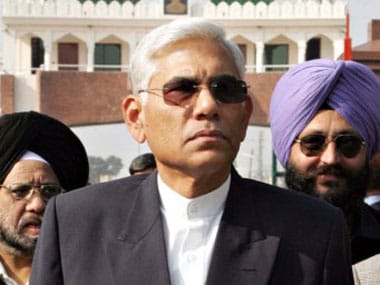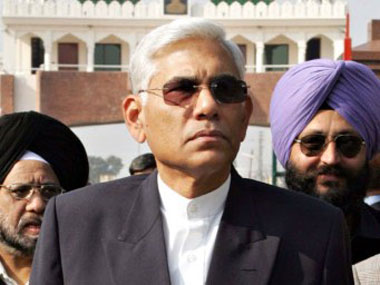When a hit-job from the outside doesn’t work, it’s time to try one from the inside. The UPA government, and in particular, the Congress’ principal voices, have been working overtime to discredit the Comptroller and Auditor-General’s report that pointed to “presumptive loss” arising from former Telecom Minister A Raja’s 2G spectrum allocation.
So desperate have they been in this endeavour that they have even resorted to the cynical expedient of wearing the spectacular flop of the 2G auction recently as a badge of honour - and claimed that the auction’s failure in effective rubbished the CAG’s calculations in respect of the notional loss to the exchequer arising from Raja’s dirty deed.None of this, of course, gained any traction.
Now, the hit-job is being carried on by an erstwhile “insider” within the CAG bureaucracy. RP Singh, a former Director-General of Post and Telecommunications at the CAG, who retired in September 2011, claims that he was told to sign off on the report by CAG headquarters even though he did not agree with its findings.
In an interview to Indian Express ( here ), Singh, who has in the past deposed before the Joint Parliamentary Committee that went into the CAG report, says that he had submitted an audit report in May 2010, iin which he had estimated the notional loss to the exchequer at a mere Rs 2,645 crore.
[caption id=“attachment_522113” align=“alignleft” width=“380”]
 The latest attack is part of an attack to discredit the CAG report. Reuters[/caption]
The latest attack is part of an attack to discredit the CAG report. Reuters[/caption]
“After this, my audit team was attached with CAG headquarters under Deputy CAG Rekha Gupta,” says Singh. Subsequently, he adds, he was sent a “heavily revised report” - which put the presumptive loss at substantially higher levels - between Rs 57,666 crore and Rs 1.76 lakh crore - and directed to issue it to the Ministry of Finance and the Department of Telecommunications.
Impact Shorts
More Shorts“There was little I could do when I got a written instruction,” says Singh.
The core of Singh’s charge is that the CAG’s final report had not been drawn up on the basis of audit guidelines. He claims he wrote to Rekha Gupta as far back as in February 2010 seeking audit guidelines, and sent reminders to the CAG headquarters, but received no reply. He further adds that he had communicated his disapproval of the audit report to the CAG, Vinod Rai. “I wrote a few letters to Rekha Gupta with a copy to the CAG explaining my views on the audit process and the calculation of loss, among other details, which I was not approving. But I never had direct interaction with CAG on this matter,” Singh told the newspaper.
It appears that Singh protests too much.His exertions appear directed at establishing that the headline numbers - in particular, the Rs 1,76 lakh crore “presumptive loss” that has become the most identifiable number in discussing the estimated loss to the exchequer. But in fact, thefinal CAG report actually gave out four different ways of calculating the potential loss to the exchequer, and arrived at four different figures from these estimations.
And, as Firstpost has noted earlier ( here ), even the CAG report does not peddle the Rs 1.76 lakh crore. What it instead did was to arrive at an estimation based on what Prime Minister and the Finance Minister themselves believed should be the right way of determining 2G spectrum prices - through market discovery of prices.
The relevant portion of the CAG report said:“Audit reiterates that (the) specific value of 2G spectrum could have been discovered only through an efficient market drawn process and,in its absence, these are the indicators available which give the hints towards the loss government could have suffered.The revenue realised through (the) auction of 3G at the rate fetched through a market process is highlighted in this report to project the benefits of resorting to an open price discovery processand the value that spectrum could command without compromising with the policy of open competition_._”
The entire campaign to discredit the CAG report - first by the UPA and Congress spokespersons by harping on the Rs 1.76 lakh crore presumptive loss estimation in the light of the latest auction flop, and subsequently by Singh - appear directed at establishing that there was no scandal in the 2G spectrum allocation by Raja.
But in fact, as the CAG report points out,“the entire process of allocation of UAS (unified access service) licences lacked transparency and was undertaken in an arbitrary, unfair and inequitable manner. The Hon’ble Prime Minister had stressed on the need for a fair and transparent allocation of spectrum, and the Ministry of Finance had sought for the decision regarding spectrum pricing to be considered by an EGoM. Brushing aside their concerns and advices, the Department of Telecommunications, in 2008, proceeded to issue 122 new licences for 2G spectrum at 2001 prices, by flouting every canon of financial propriety, rules and procedures.”
Additionally, the CAG report pointed out, “the DoT did not follow its own guidelines on eligibility conditions, arbitrarily changed the cutoff date for receipt of applications post facto and altered the conditions of the FCFS (first-come-first-served) procedure at crucial junctures without valid and cogent reasons, which gave unfair advantage to certain companies over others”.
This argument has been upheld by the Supreme Court, which cancelled the 122 licences, and in fact it is the heart of the 2G scam. It is this that the rats that are steadily chewing away at the CAG report want to divert attention from.
Venky Vembu attained his first Fifteen Minutes of Fame in 1984, on the threshold of his career, when paparazzi pictures of him with Maneka Gandhi were splashed in the world media under the mischievous tag ‘International Affairs’. But that’s a story he’s saving up for his memoirs… Over 25 years, Venky worked in The Indian Express, Frontline newsmagazine, Outlook Money and DNA, before joining FirstPost ahead of its launch. Additionally, he has been published, at various times, in, among other publications, The Times of India, Hindustan Times, Outlook, and Outlook Traveller.
)